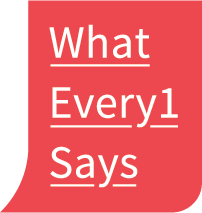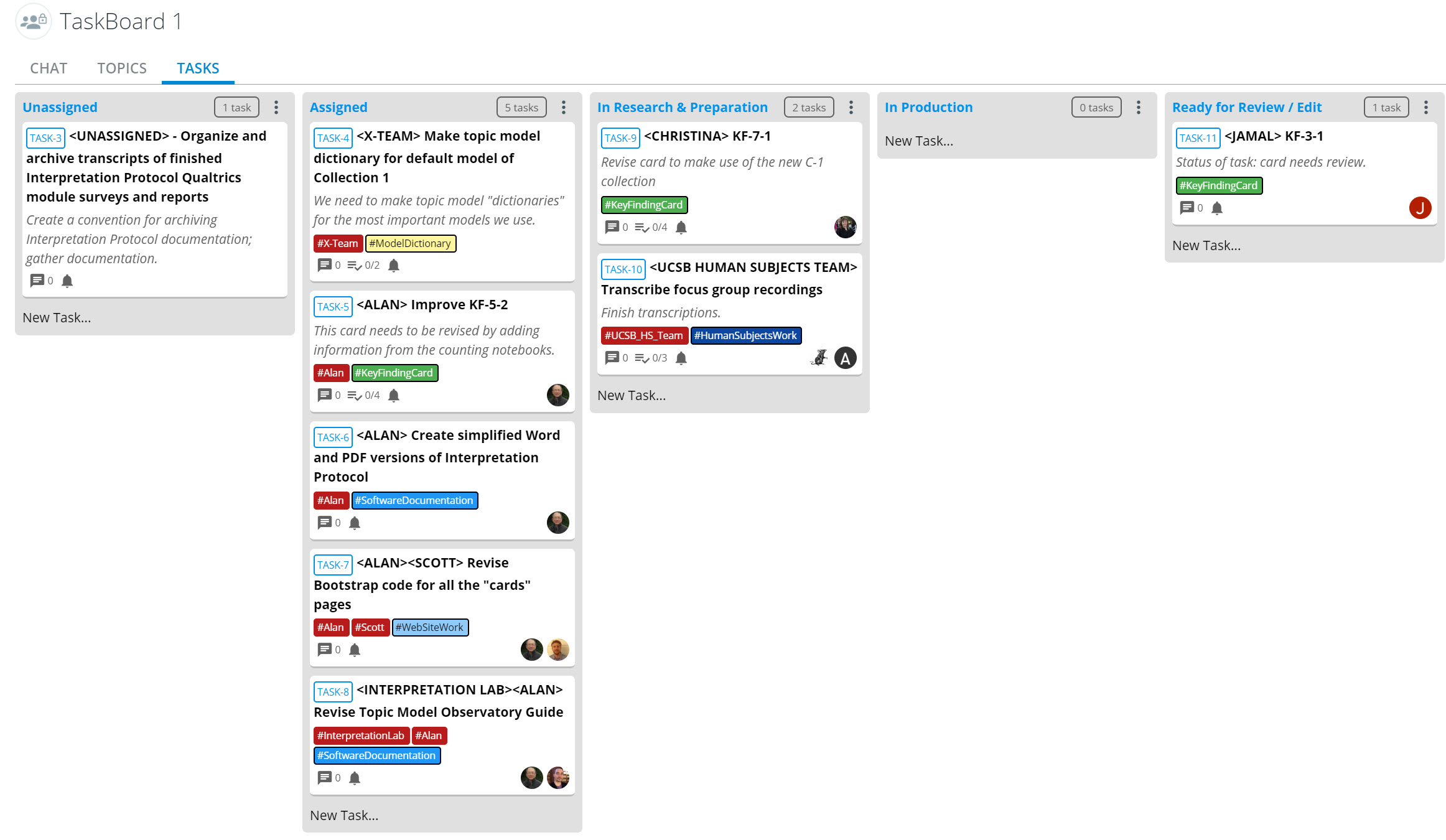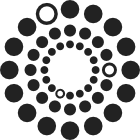The third WE1S summer research camp takes place simultaneously at U. California, Santa Barbara (UCSB), California State U., Northridge (CSUN), and University of Miami (UM) during June 29 through July 31, 2020—four days a week (five paid working hours per day): Mondays through Thursdays, 10am-1pm, 2-4pm. (See below for schedule of activities.)
Due to COVID-19 restrictions on in-person research activities, this summer the camp will be conducted through synchronous Zoom (in all-hands, multiple-meetings, and breakout-rooms formats) complemented by WE1S’s asynchronous collaboration platforms (Ryver and Google Drive). The Zoom meeting address for all hands each day will be: https://ucsb.zoom.us/j/97989019837 (password required). There are also separate Team Zoom meeting addresses. (Note: For the benefit of some participants who are on the other side of the world or who occasionally need to work asynchronously, parts of all-hands Zoom meetings will be recorded for private project use. Recordings will be available on the WE1S Google Team Drive in the folder Recordings and Videos.)
Participants
This summer all three of WE1S’s institutions are participating in the summer research camp.
Participant contact info | Team meeting spaces (private to WE1S).
UCSB Summer Research Group
Faculty
- Alan Liu (UCSB English, WE1S PI)
- Jeremy Douglass (UCSB English, WE1S co-PI)
Postdoctoral Scholars (Staff Research Associates during summer 2020)
- Dan Costa Baciu (Ph.D., 2018, Architectural History, Illinois Institute of Technology)
- Abigail Droge (Ph.D., 2018, English, Stanford University; Stanford Literary Lab member)
Research Assistants
- Rebecca Baker (English) (WE1S Project Manager)
- Alanna Bartolini (English)
- Susan (Su) Burtner (Geography)
- Philip Cortes (English)
- Helen Foley (English / Economics)
- Jessica Gang (English / Political Science)
- Sean Gilleran (History)
- Cindy (Xindi) Kang (Media Arts & Technology)
- Surojit Kayal (English)
- Nazanin Keynejad (Comparative Literature)
- Ryan Leach (English)
- Sihwa Park (Media Arts & Technology)
- Christina Roberts (History)
- Jamal Russell (English)
- Tyler Shoemaker (English)
- Leila Stegemoeller (English)
CSUN Summer Research Group
Faculty
- Scott Kleinman (English, WE1S co-PI)
- Mauro Carassai (Liberal Studies)
Research Assistants
- Joyce Brummet (English)
- Kyle Duncan (English)
- Melissa Filbeck (English, Texas A & M)
- sam goli (English)
- Malinda Hackett (English)
- Joseph Jaffray (English))
- Kenia Rodriguez (English, University of Connecticut)
- Raymond Steding (English)
- Amy Windham (English)
U. Miami Summer Research Group
Faculty
- Lindsay Thomas (U. Miami English, WE1S co-PI)
Research Assistants
- Francesca Battista (Modern Languages & Literatures)
- Suchismita Dutta (English)
- Ashley Hemm (English) (WE1S Project Manager)
- Alexandria Morgan (English)
- Tarika Sankar (English)
- Dieyun Song (History)
Teams & Taskboards
Teams for the summer will be set up based (with adjustments) on those that were active during the previous summer research camp or academic year 2019-20. (Team Zoom meeting addresses)
The teams will work on tasks tracked on taskboards kept in Ryver in a “kanban”-style task system. The main kanban is TaskBoard 1.
During morning (“AM”) sessions, most teams will focus on research activities related to ongoing interpretation of WE1S data (“collections”) and models (topic models)—culminating, for example, in the writing of Key Finding cards, Collection & Model cards, Key Methods cards, topic model dictionaries, etc. Then in afternoon (“PM”) sessions, many teams will segue from their research to related “research-to-action” work—e.g., producing Call-to-Action and Call-to-Communication recommendations in WE1S’s documentation “cards” system and assembling them with research examples in WE1S “research-to-action toolkits” for different audiences. (Teams have the flexibility to set their own daily tasks in ways that vary from the above general plan. The main idea is that teams will be more productive and fresher in their work if they transition from AM to PM each day between different, related tasks.)
Some teams or individuals will work on other specialized workflows organized on different taskboards–e.g., TaskBoard 2 for the packaging, dissemination, and archival deposit of WE1S datasets and software.
The summer research camp will begin with several days of orientation to familiarize participants with current project methods and workflows, and to allow for team and task planning. The camp will close on July 31, 2020, with a showcase event in which participants record lightning talks on selected project outcomes chosen for impact and to address WE1S’s various audiences (public, student, DH community, etc.). (See below for schedule of activities.)
Context for WE1S participants who were away from the project since last summer or who are new.
During academic year 2019-20, versions of the research teams from last summer (or individuals from those teams) continued their research and interpretation activities. Some new activities such as those of the Human Subjects team at U. Miami also started up.
An important new development is that WE1S has adopted a documentation “cards” system for reporting research and other outputs in a public-facing way. For example, interpretive research on topic models that produce a chain of research documentation (Interpretation Protocol modules, notes, reports, etc.) are now summarized in Key Finding cards. Such research findings then drive “research-to-action” recommendations, which are also presented in a cards format (e.g., “Call-to-Action” and “Call-to-Communication” cards).
Another new development is that WE1S has adopted a “kanban”-style taskboard system for organizing and tracking work (an evolution from the cards “queue” it used during the last academic year).
Teams (Team Zoom meeting addresses)
(The following teams & members (and their research focus) will be adjusted during orientation week. The initial line-up below is based on teams from the previous summer or academic year. The numbering of teams from the past has been retained where possible, though teams may be listed in a different order.)
Issues Teams
-
-
Team 3 (Social Groups and the Humanities)
- Members: Susan (Su) Burtner, Melissa Filbeck, sam goli, Jamal Russell, Tyler Shoemaker
-
Team 4 (Value of the Humanities)
- Members: Francesca Battista, Mauro Carassai, Phillip Cortes, Surojit Kayal
-
Team 5 (Broader profile of the humanities in society)
- Members: Malinda Hackett, Alan Liu, Tarika Sankar, Amy Windham
-
Team 6 (Humanities in Different Media, including Social Media)
- Members: Joyce Brummet, Kyle Duncan, Joseph Jaffray, Ryan Leach, Kenia Rodriguez, Ray Steding
-
Team 7 (Impact of government, funding agencies, and foundations)
- Members: Alanna Bartolini, Sean Gilleran, Christina Roberts, Dieyun Song
-
Human Subjects Research Teams
-
-
Team 8 (UCSB Human Subjects)
- Members: Rebecca Baker, Abigail Droge, Helen Foley, Jessica Gang, Leila Stegemoeller
-
Team 9 – (U. Miami Human Subjects Team)
- Members: Francesca Battista, Suchismita Dutta, Ashley Hemm, Alex Morgan, Tarika Sankar, Dieyun Song, Lindsay Thomas
-
Technical Teams
-
-
Dataset & Software Team
- Members: Jeremy Douglass, Scott Kleinman, Lindsay Thomas
-
Visualization Team (Interpretation Lab)
- Members: Dan Baciu, Cindy Kang, Sihwa Park
-
Other Teams
-
-
X-Force Team (Special Tasks, including web site, bibliography, etc.)
- Team coordinator: Rebecca Baker
- Members: Suchismita Dutta, Ashley Hemm, Naz Keynejad , Alex Morgan, Leila Stegemoeller, Amy Windham, Dieyun Song
- Possible X-Team tasks: (see camp planning document)
-
Taskboards
- TaskBoard 1 (main project taskboard)
- TaskBoard 2 (datasets & software taskboard)
Schedule of Activities (June 29 – July 31)
The following schedule and description of activities may evolve.
Note: For the benefit of some participants who are on the other side of the world or who occasionally need to work asynchronously, parts of all-hands Zoom meetings will be recorded for private project use.
Orientation week (June 29-July 2)
- Monday (Orientation Day 1)
- AM Session (10am-1pm)
- Introductions
- Alan:
- Summer camp overview
- Review of research materials and research workflow (collections, models, visualizations, counting notebooks, Interpretation Protocol, reporting documentation, cards system)
- Instructions on tracking workflow on Taskboards.
- Adjustment of teams & members
- PM Session (2-4pm)
- Rebecca & Ashley:
- Zoom protocols (how we will use Zoom in all-hands, multi-meeting, and /or breakout room formats)
- Best practices to prevent “Zoom fatigue” (See “Summer Camp Zoom Fatigue Suggestions”)
- Jeremy: SNACK (Summer Not-Altogether Camp) project
- Multi-meeting or Breakout sessions: (Team Zoom meeting addresses)
- Teams review their work to date (and prepare to report a summary the next morning)
- When reviewing work, please go this the Document Deposit Register spreadsheet and fill in where possible the columns labeled in blue .
- X-Team members meet for planning (coordinated by Rebecca, with the consultation of PIs as needed)
- Teams review their work to date (and prepare to report a summary the next morning)
- Rebecca & Ashley:
- AM Session (10am-1pm)
- Tuesday (Orientation Day 2)
- AM
- Teams give briefing reports on completed and ongoing research to date.
- Abigail: Cards and Roadmapping Overview
- “Building a Research-to-Action Roadmap” worksheet
- Note: Each team has a uniquely-named copy of this worksheet in their working folder–e.g., WE1S Team Drive > _Team Working Space> Team 3 > _Roadmap Planning > “Team 3 – Building a Reserch-to-Action Roadmap Worksheet”
- “Building a Research-to-Action Roadmap” worksheet
- Alan: Review of early 4Humanities.org discussions of “framing” the humanities and of humanities advocacy (PowerPoint slides from 2014 talk) (Google Slides version)
- Recommended materials:
- The Frameworks Institute, “Beginner’s Guide to Strategic Frame Analysis” (2009) (slides requiring Flash).
- A. Liu, “Creating a Humanities Advocacy media Plan” (2011) (Prezi presentation) (see only first few slides).
- Recommended materials:
- Discussion
- PM
- Multi-meeting or Breakout sessions:
- Teams begin work on their “Building a Research-to-Action Roadmap” worksheet
- Note: Each team has a uniquely-named copy of this worksheet in their working folder–e.g., WE1S Team Drive > _Team Working Space> Team 3 > _Roadmap Planning > “Team 3 – Building a Reserch-to-Action Roadmap Worksheet”
- X-Team members meet with project management group (PIs, postdocs, or project managers as appropriate) for planning.
- Teams begin work on their “Building a Research-to-Action Roadmap” worksheet
- Multi-meeting or Breakout sessions:
- AM
- Wednesday (Orientation Day 3)
- AM
- All-hands discussion of teams’ “Building a Research-to-Action Roadmap” worksheets so far.
- Breakout sessions: Teams continue work on their “Building a Research-to-Action Roadmap” worksheet
- PM
- Teams continue working on the roadmap worksheet.
- AM
- Thursday (Orientation Day 4)
- AM
- Brief all-hands session
- Teams continue working on the roadmap worksheet.
- PM
- 2:00 pm: Teams report to all-hands on their Research-to-Action Roadmap worksheets
- 3:00 pm: For anyone interested: Lindsay will give an orientation to the counting notebooks (and related notebooks) in the all-hands Zoom meeting.
- 3:00 pm: Other teams continue working:
- Teams and individuals post initial tasks on the project TaskBoards.
- AM
Regular Weekly Schedule during the Camp
As described above:
During morning (“AM”) sessions, most teams will focus on research activities related to ongoing interpretation of WE1S data (“collections”) and models (topic models)—culminating, for example, in the writing of Key Finding cards, Collection & Model cards, Key Methods cards, topic model dictionaries, etc. Then in afternoon (“PM”) sessions, many teams will segue from their research to related “research-to-action” work—e.g., producing Call-to-Action and Call-to-Communication recommendations and writing them up in WE1S’s documentation “cards” system. (Teams have the flexibility to set their own daily tasks in ways that vary from the above general plan. The main idea is that teams will be more productive and fresher in their work if they transition from AM to PM each day between different, related tasks.)
Note: For the benefit of some participants who are on the other side of the world or who occasionally need to work asynchronously, parts of all-hands Zoom meetings will be recorded for private project use.
- AM: 10am – 1pm
- PM: 2pm – 4pm
- Thursday progress update meetings (“accountability Thursdays”)
- All-hands meetings at the beginning of the PM sessions on the Thursdays of each week for project participants to brief everyone on their progress during the week. Because we are putting the emphasis on making progress and actually finishing things this summer, we are informally calling these meetings “accountability Thursdays.”
Summer Capstone Event (July 31)
- Advance work for the event during the last week of July
- Teams prepare the script and materials for a lightning talk on a selected finding or output chosen for impact and to address one of WE1S’s possible audiences.
- Friday, July 31
- Recording of lightning talks.
- Virtual happy hour to close the camp.
Advance Orientation Materials (for new WE1S RAs)
Research assistants who are new to WE1S may find it helpful to read the following materials in advance of the start of the camp if they are not already familiar with the project’s goals and methods.
About WE1S Mission and Context
WE1S Prospectus — This prospectus is a shortened distillation of the original grant proposal submitted by WE1S to the Andrew W. Mellon Foundation.
About WE1S Technical Methods
The main digital humanities method used by WE1S to understand pubic discourse on the humanities is “topic modeling” — an important computational “machine learning” approach shared with other areas in the social sciences and the sciences. WE1S is also experimenting with other text analysis methods that extend, complement, or provide alternatives to topic modeling, including “word embedding” (or “word vectors”).
WE1S is implementing the above methods by developing a workflow system (Workspace and Manager) that is innovative as a paradigm for open, reproducible research in the digital humanities but that borrows for its nuts-and-bolts from common basic methods in the digital sciences, social sciences, and humanities. These nuts and bolts include the use of Markdown, scripting languages, serialization protocols (such as JSON), Jupyter “data science” notebooks, “containerization” solutions such as Docker, and versioning repository systems such as Github.
It is not important that all WE1S participants be hands-on with the project’s core technical or nuts-and-bolts methods. But for basic literacy about what is involved as participants analyze the results of topic modeling or listen to demos and presentations about the project’s technical platform, some preliminary reading is useful. Participants who are new to WE1S are asked to read (or, in the case of some web sites, browse) the following materials to gain orientation:
Topic Modeling
- (3) David M. Blei, “Probabilistic Topic Models” (2013)
 — (read only to end of p. 79, before the math begins)
— (read only to end of p. 79, before the math begins) - (4) Edwin Chen, “Introduction to Latent Dirichlet Allocation” (2011)
- (5)Ted Underwood, “Topic Modeling Made Just Simple Enough” (2012)
- (6) Andrew Goldstone’s interface for exploring topic models. The Signs model has some extra, later-developed features. Especially helpful in learning how to work with these models is the guide page on “Interpreting the topic model of Signs“
- (7) John Mohr and Petko Bogdanov, “Topic Models: What They Are and Why They Matter” (2013)
 . This article is paywalled. UCSB students have free access through campus network or from off-campus through the UCSB VPN or Library Proxy server. CSUN students can access the article here through the campus network or VPN. There is also an open-access manuscript version.
. This article is paywalled. UCSB students have free access through campus network or from off-campus through the UCSB VPN or Library Proxy server. CSUN students can access the article here through the campus network or VPN. There is also an open-access manuscript version.
WE1S Platform for Interpretation of Topic Models
- (8) Topic Model Observatory Guide [requires project participant password] — FAQ guide to the visualization interfaces that WE1S uses to interpret topic models
- (9) Interpretation Protocol — a set of Qualtrics surveys that guide and record various steps of interpretation (flowchart of planned survey modules)
Scheduling Absences from the Research Camp
Some participants in the summer research camp have obligations that require them to be away during particular days of the camp or during parts of each day, which is fine. The teams on which a participant sits can work around absences. But it would be ideal if participants can pre-schedule absences by bringing them to the attention of the project PI and project managers.



